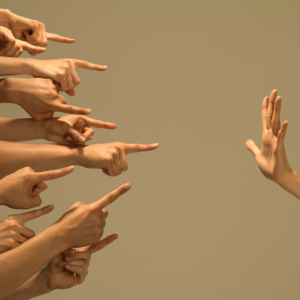Is it bad to be Judgemental?
Most of the people don’t realise they are being judgemental and how it deeply affects their lives. What makes a person judgemental? Anyone having a fixed mindset about another person or situation is called a judgemental person. Even when it is constructive criticism, the person doing it is being judgemental. Others who think they are far from judging others are usually suppressing their opinions or judging themselves to be not good enough to have a point of view. In all, judgements affect us deeply. It has more repercussions than generally understood. Here are a few insights on how judgements affect our lives, living and reality.
Why do we judge others?
Judgement is something that we all experience from time to time. Whether it’s our reaction to another person’s actions or how we perceive them, some people define it as having “harsh opinions or ideas.” These judgments are sometimes based on personal experiences or our own failures.
We spot what we got. When we judge others based on our emotions, or our own failures, we often project onto others the very qualities we hold most repugnant about ourselves. In many cases, the things we say about others reflect how we feel about ourselves. In reality, we don’t like facing our shadow self. One of the best defences against it is to project it onto others before they can see it.
Why do I need to know if I am being judgemental?
When we’re not aware of our judgmental nature, we get angry, anxious, rude, bashful, furious and lonely. Not only do we shut ourselves off from others, but we also shut ourselves off from our true selves.
Judgements also create limitations. You fail to see the truth and possibilities beyond your limited point of view. You block your own growth, potential and receiving by being judgemental. For instance, if there were five investors ready to support your business and judged three of them to be inadequate or bad, you have already limited your financial flow to two investors.
When we judge something to be bad, it can only show up as that. You won’t be able to see it as anything else or allow it to be anything else. This is the risk of being judgemental. You would hold on to your perception to prove your judgements to be right rather than having the freedom to change it.
How do I know if I am being judgemental?
Here are a few signs of a judgemental person. You have trouble with uncertainty and ambiguity. You think that everybody is trying to harm you. You find it difficult to look past someone’s imperfections. You are quick to draw conclusions. It is more important for you to be right than to be free. You see people as white or black. There is no room for a middle ground. Your first approach towards a situation is negative. You anticipate constant consistency from other individuals. Most importantly, you criticise yourself more harshly than others. If you can relate to any of these or get triggered while reading it, being judgemental is likely to be an issue for you.
How do I stop being Judgemental?
Acknowledge: We enjoy passing judgement on others. And almost always, we do it without fully understanding the person we are judging. We enjoy it because it emphasises our biases. Unless we identify and acknowledge that we are choosing to be judgemental, it will be difficult to change it. Acknowledge without judging yourself is the first step to stop being judgmental.
Be compassionate, patient, and empathetic: This requires giving the person or situation a space for being themselves without being judged. It allows the person to be vulnerable and honest. Surprisingly, when you are compassionate towards others, they tend to either back off or change to become more understanding and amiable.
Allowance: As you already know, people behave the way they do because they choose to do it. There is no reason or logic to it. If a person is choosing to judge you, allow them instead of fighting it or avoiding it. Both are an energy drain on you. When you allow yourself to be judged, the game is dropped. People won’t challenge or fight you. Allowance also gives you more lightness and expansion not to judge others.
Hope these insights give you an understanding of the repercussions of being judgemental and an idea on how to deal with judgemental people.
Everyone has a story.
Walk our path,
Live our life,
Then maybe you won’t feel the need to judge
By Sonali Mittra and Navita Sharma
(Sonali is a therapist and researcher. Navita is an access bars practitioner, dietitian, and nutritionist)





This blog on Is It Bad to Be Judgmental? really made me pause and reflect on my own thought patterns. I never realized how much judgment is tied to our own fears and projections! The strategies shared here to shift toward self-awareness and empathy are so valuable. Definitely something I’ll be practicing more consciously.
I love how this blog on Is It Bad to Be Judgmental? doesn’t just label judgment as ‘good’ or ‘bad’ but actually explores why we do it. It’s a powerful reminder that judgment often comes from our own insecurities or past conditioning. Learning to shift from judgment to curiosity has been a game-changer for me!
This was such an eye-opening read on Is It Bad to Be Judgmental? It really made me reflect on how often we judge others (and even ourselves) without realizing it. The part about understanding the root of our judgments really resonated with me—awareness is truly the first step to change!
This was such an insightful read! I’ve often wondered, ‘Is it bad to be judgmental?’ and your perspective really made me reflect on my own thought patterns. I love how you broke down the reasons behind judgment and provided actionable steps to shift our mindset.
This article on emotional resilience is such an insightful read! It’s incredible how resilience isn’t just about bouncing back but also about adapting and growing through challenges. The part about asking the right questions really resonated with me—I’ve seen firsthand how self-reflection can shift perspectives in difficult times.
This was such an insightful read! I’ve always wondered if being judgmental is inherently bad or if it has some value in certain situations. Your perspective really made me reflect on my own tendencies and how they impact my relationships. Loved the way you broke it down—definitely bookmarking this!
The connection between being judgemental and self-criticism was eye-opening. It’s true that harsh judgments of others often mirror how we treat ourselves. This article encourages a more empathetic approach to both self and others.
I appreciated the actionable steps provided to become less judgemental. Acknowledging our biases and practicing compassion are so important. This piece offers valuable insights for anyone looking to foster better relationships and personal well-being.
Reading this was a wake-up call. I often find myself making quick judgments without understanding the full picture. The idea that judgments can block our own potential is profound. I’ll be more mindful moving forward.
This article really made me reflect on my own tendencies. I never realized how being judgemental could limit not just my relationships but also my personal growth. The part about projecting our own insecurities onto others hit home. Thank you for shedding light on this!
Beautifully written! Being judgemental is often misunderstood, but you explained the emotional layers behind it so well. I feel more empowered to examine my inner critic now.
I love how you turned the concept of being judgemental into a growth opportunity. It’s not something to suppress but to explore with compassion. This really shifted my mindset.
Wow, this article gave me so much clarity. I’ve been ashamed of my judgemental thoughts for years. Now I realize they can be an invitation to self-reflection instead of guilt.
I really appreciated how you unpacked the difference between harmful judgement and intuitive discernment. Being judgemental isn’t always wrong—it’s how we relate to it that matters.
This was such a refreshing read! I’ve always wondered if being judgemental makes me a bad person, but now I see it as a mirror for my own unhealed parts. Thank you for this perspective.
This article really made me reflect—‘Is it bad to be judgemental?’ isn’t just a question, it’s an invitation to look deeper into our emotional responses. Loved how you explored both sides without making it black and white. Insightful read!
This blog really made me reflect on my own habits. I used to think being judgemental was just part of human nature, but now I see how much it limits connection and compassion. Thank you for this eye-opener!